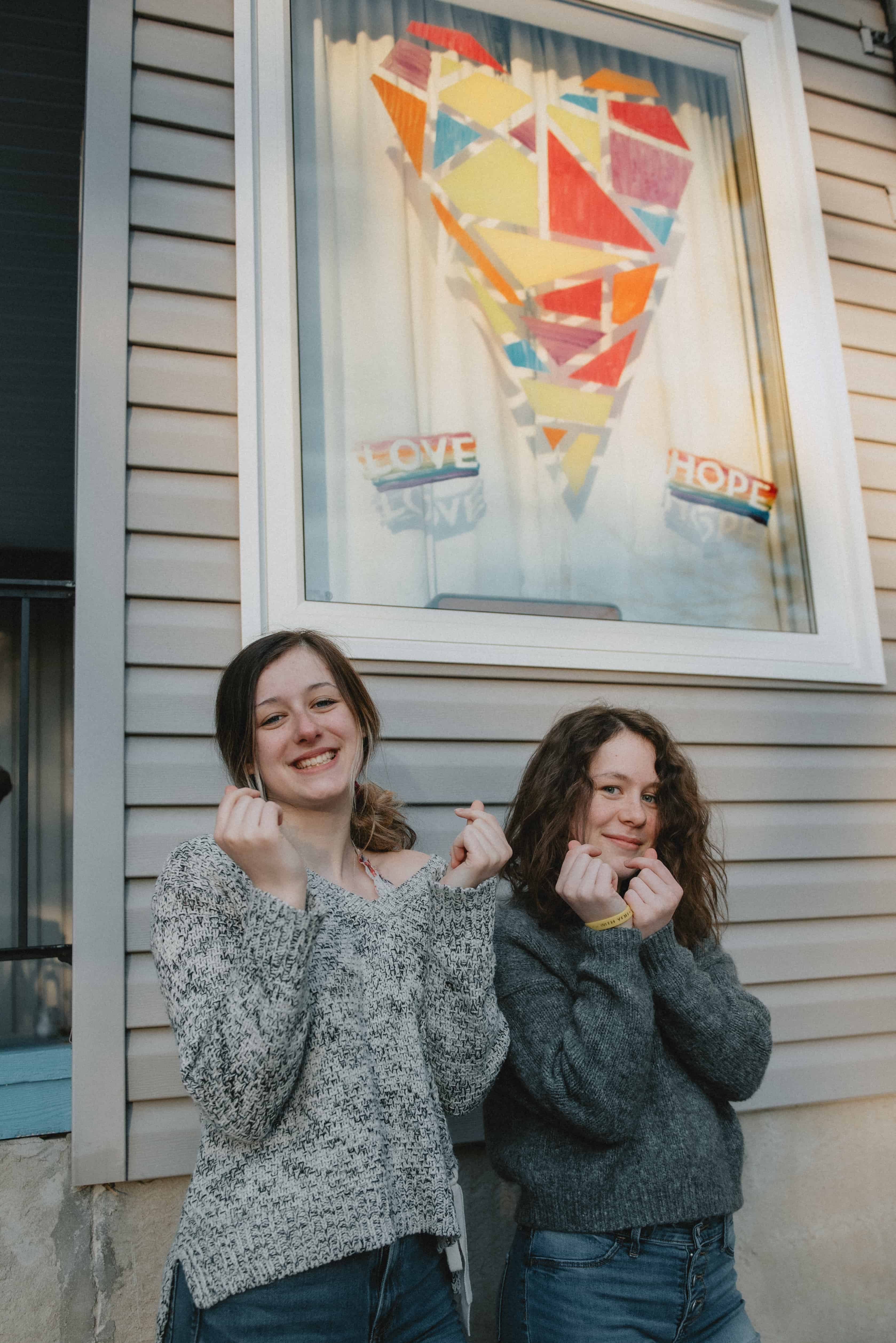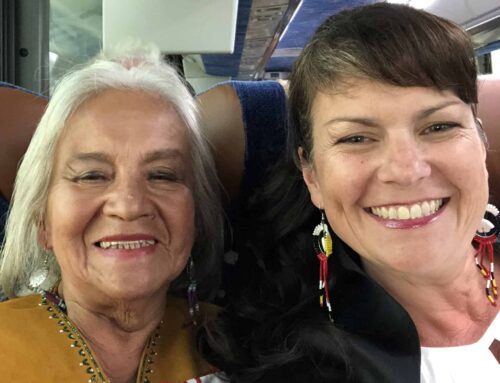Although you may not always hear their voices, girls across Canada are sending powerful messages of hope and positivity during the COVID-19 pandemic. The painted heart in the window of Ruby and Matilda MacMillan’s rural Ontario home is just one of those messages.
These sisters participate in the Girls’ Rising Empowerment Group in Killaloe, Ont., one of many girls’ programs funded by the Canadian Women’s Foundation that’s continuing to keep girls virtually connected and supported during isolation.
“I’ve been blown away by the ways service providers are moving quickly, problem-solving and finding ways to remain connected to the girls,” says Rudayna Bahubeshi, a Program Manager for the Foundation’s Girls’ Fund. The programs aim to build the confidence, resilience and leadership skills of girls, as well as trans, Two-Spirit, and non-binary youth aged 9 to 13. Though the programs can’t hold in-person sessions, many continue to engage participants online through positive discussions and community activities.
After weeks of social distancing, many girls are not only missing friends, sports, after-school activities, and just getting out of the house; they’re also potentially coping with stressful and serious issues at home – parents or caregivers who’ve been laid off, unstable living situations, food insecurity, or abusive family members – day in, day out. “I’m hearing a lot about how programs are shifting their conversations with girls, to help them process what is such an inexplicable and confusing moment in our lives,” Bahubeshi says.
At the North York Community House in Toronto, program staff transitioned to meeting with the girls through Google Hangouts, as well as using social media to share ideas for positive and healthy activities. “We suggested that they keep a journal during the pandemic, and jot down things they’re doing, or the ways that they’re coping,” says program worker Rickysha Jn-Baptiste. “Since school is out indefinitely, we’ve also discussed doing online drop-in homework help sessions via Zoom, with mentors who are available to help.”
At Girls Inc. of Northern Alberta, staff have been able to shift three programs online so far, and they’re planning to expand their offerings in May. “When we tested out our girls’ mentoring program, it was unexpectedly successful,” says Nanase Tonda, Executive Director. “We had 15 girls participating and nobody wanted to leave. They said, ‘Hey, we miss you guys!’ and ‘What are you up to?’, and they were all supporting each other, which was fantastic to see.” Tonda says the recent flooding in Northern Alberta has added another layer of stress to the area, and the organization is doing its best to encourage girls to be there for each other.
The girls’ program at the Multicultural Family Resource Society in Edmonton has actually increased sessions, so they can meet virtually with girls twice a week, says Tsion Demeke Abate, programs coordinator. “There’s a community of support – even though they’re young and they don’t have the language for it, they’re supporting one another.” Through girls’ discussions, Abate says she’s continuing to empower them – whether it’s by prioritizing the activities and issues they want to address, or asking some of them to lead the group. “So I’ll say, ‘OK, next session, two girls will be responsible. And at the beginning all you have to do is ask participants about recent highlights or lowlights, or something that’s been surprising, and then move on to COVID-19 updates.’ Through this process I hope we get to develop their critical skills, their decision-making, and their leadership qualities.”
Many programs are going beyond their mandates to serve not only the girls, but also their families and communities during the pandemic. When isolation started, Jn-Baptiste said they lent out tablets and laptops to girls who didn’t have their own devices to use at home. They also checked in with the parents by phone to see how they and the girls were doing. Similarly, Abate says they’ve been sending out “resource lists for kids, but also for parents” to help families meet basic needs, and to help answer questions like, “How do I apply for EI?” In some communities, there are barriers to connecting online, such as lack of reliable Internet access or cell service in rural areas. But program staff are finding ways around the digital divide, such as working with local schools to send resources home to girls, or finding other ways to bridge the gaps, Bahubeshi says.
Through their efforts to adapt, girls’ program coordinators are helping to alleviate the loneliness, boredom, and uncertainty the girls are facing. They’re also re-connecting the girls with a safe space that the programs provide, and reminding girls that they do have resources for help, if it’s needed. “The stressors on girls and caregivers should not be underestimated,” Tonda says, explaining that current circumstances intensify risk factors, such as mental illness, substance abuse, and domestic violence targeted at girls who are stuck at home. Though the COVID-19 pandemic will pass, many service providers are braced for the impact it will have on their communities for years to come.
“We’re there for girls no matter what,” Tonda says, “That’s the message we’re trying to put out.”
The Foundation has launched the Tireless Together Fund to help ensure that vulnerable women and girls aren’t left behind in the COVID-19 crisis. Your contribution will help critical programs for diverse women, girls, and trans and non-binary people continue through the pandemic.
Learn More:
Facebook Live: Impacts of COVID-19 on Girls and Youth
The Facts: Women and Pandemics
Women Leaders in COVID-19: Seen and Unseen
Women’s “Worry Work in the COVID-19 Pandemic
The Difficult Economic Side-Effects of COVID-19 for Women
The Gendered Impacts of Coronavirus







